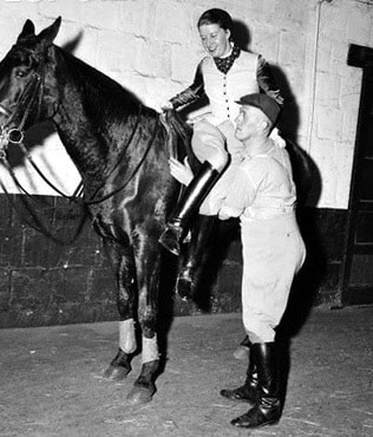About Therapeutic riding

One of the most interesting things the inspiration for the industry. A woman with physical disabilities was one of the first women to compete against men in the Olympics. Lis Hartel of Denmark won the 1952 Individual Dressage Silver medal, being the first woman to podium alongside men in direct competition! She inspired an entire movement that spread throughout Europe and the United States, then globally.
Therapeutic Riding is not just pony rides. While some riders may never be independent because their goals are communication, other riders can emerge from their disabilities to show incredible abilities in the saddle! We believe holding a certification is important for the industry (there are lots of backyard teachers...and lots of accidents). Our code of ethics includes that we will "do no harm" when we put someone with a disability on the back of a horse. As instructors, we are subject to various written and practical tests, and are required to attend comprehensive workshops for our certifications. We also must test on our own horsemanship skills.
I am proud of all of EQUU8's students, but there are two teenagers at EQUU8 who are now independent walk/trot/canter riders. One rides dressage (well...balanced seat right now) and the other rides western/trail. She is motivated to volunteer (she can groom and tack her own horse correctly) and she dreams to ride in the Paralympics some day...and she is blind. We are having her evaluated for her division in the Paralympics and have her scheduled to attend a third-party Paralympic dressage clinic in November (she's scared and excited). She often requires a scholarship to ride because her family struggles financially and she has had over 30 eye surgeries and faces weekly barometric chamber treatments to try to save her right eye. This girl is 16...can you imagine how that might affect her psychologically? Horses keep her going each week.
The other student I mentioned...had never sat upon a horse until 2014 and began riding at age 14 with a horse leader and two sidewalkers but now loves working on lateral movements and balance at the canter...and he is deaf with ADHD. We put him in group lessons when he was 15 so he had to start paying attention around him. His mom was worried about putting him on the road with other drivers, but credits those group lessons with helping him pass his driver's test.
To me, those kids get to a point where you're not providing therapeutic riding, you're providing horsemanship.
Therapeutic Riding is not just pony rides. While some riders may never be independent because their goals are communication, other riders can emerge from their disabilities to show incredible abilities in the saddle! We believe holding a certification is important for the industry (there are lots of backyard teachers...and lots of accidents). Our code of ethics includes that we will "do no harm" when we put someone with a disability on the back of a horse. As instructors, we are subject to various written and practical tests, and are required to attend comprehensive workshops for our certifications. We also must test on our own horsemanship skills.
I am proud of all of EQUU8's students, but there are two teenagers at EQUU8 who are now independent walk/trot/canter riders. One rides dressage (well...balanced seat right now) and the other rides western/trail. She is motivated to volunteer (she can groom and tack her own horse correctly) and she dreams to ride in the Paralympics some day...and she is blind. We are having her evaluated for her division in the Paralympics and have her scheduled to attend a third-party Paralympic dressage clinic in November (she's scared and excited). She often requires a scholarship to ride because her family struggles financially and she has had over 30 eye surgeries and faces weekly barometric chamber treatments to try to save her right eye. This girl is 16...can you imagine how that might affect her psychologically? Horses keep her going each week.
The other student I mentioned...had never sat upon a horse until 2014 and began riding at age 14 with a horse leader and two sidewalkers but now loves working on lateral movements and balance at the canter...and he is deaf with ADHD. We put him in group lessons when he was 15 so he had to start paying attention around him. His mom was worried about putting him on the road with other drivers, but credits those group lessons with helping him pass his driver's test.
To me, those kids get to a point where you're not providing therapeutic riding, you're providing horsemanship.